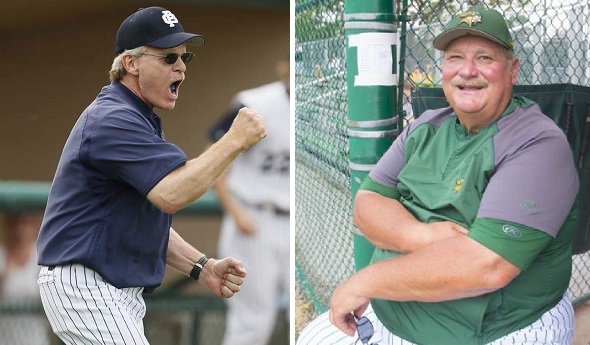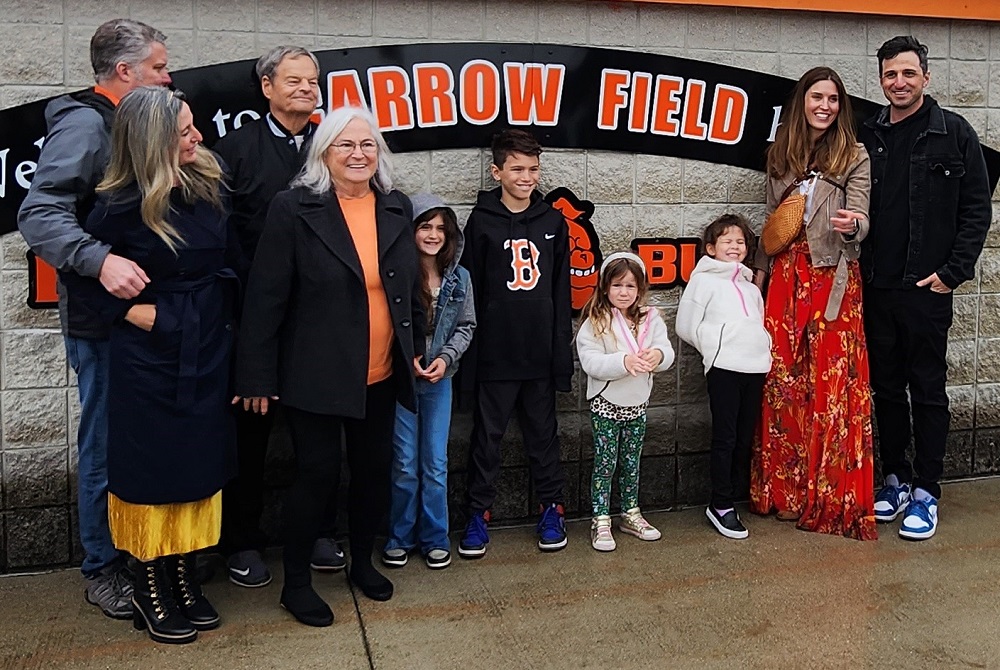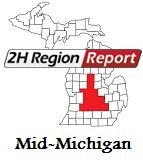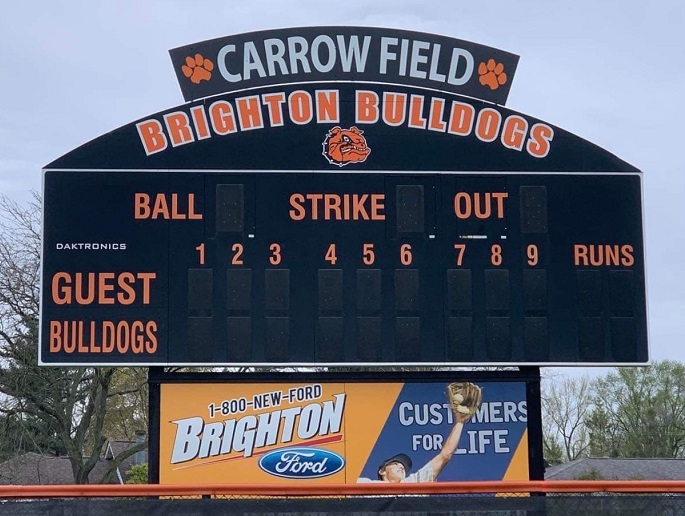
Pointes' Pride Instilled by Longtime Leaders
By
Tom Markowski
Special for Second Half
May 31, 2017
GROSSE POINTE – Neither Frank Sumbera nor Dan Griesbaum were raised in Grosse Pointe.
 But no one, at least at the high school level, has done more to enhance and promote baseball in the Pointes than this long-serving pair.
But no one, at least at the high school level, has done more to enhance and promote baseball in the Pointes than this long-serving pair.
Sumbera, 69, is in his 45th season as coach at Grosse Pointe North and Griesbaum, 64, is in his 34th season at Grosse Pointe South. In this sport the rivalry that exists between Grosse Pointe’s two public high schools is as good as it gets. Sumbera holds the upper hand in MHSAA Finals titles, 2-1, and Griesbaum has the edge in District titles, 23-14.
This last statistic is notable in a sense that the two programs are often paired in the same District, as they are this season. South will host North in a Division 1 District Semifinal at 10 a.m. Saturday.
This season there is an added twist to the much-anticipated community showdown. Grosse Pointe Woods University Liggett, for the first time, will compete in the Division 1 tournament lined up on the other side of the bracket from North and South. University Liggett will play Detroit East English in the other Semifinal at 11:30 a.m. The winners will play for the title approximately 2 p.m.
University Liggett won four MHSAA Finals titles the past six seasons, two in Division 4 and two in Division 3, including last season in the latter. Coach Dan Cimini, knowing he had a strong team returning, petitioned the MHSAA to opt up to Division 1 for this season and 2018.
So far the Knights have proven they can hang at the Division 1 level. They are ranked No. 2 in the latest poll released by the Michigan High School Baseball Coaches Association.
And Cimini’s group received a break in the draw as it won’t have to defeat both North and South to win the District title.
This is Cimini’s 14th season as head coach, and he tips his hat to the job Sumbera and Griesbaum have done in laying the groundwork.
“Frank has been there forever,” Cimini said. “Dan has been there a long time. I feel old, and I’m 48. I’ve coached 22 years. No doubt about it, those guys have set the standard.”
Cimini grew up in Grosse Pointe and competed in the city’s strong Little League program. He played for Griesbaum at South and played four years in college, two at Macomb College and two at University of Detroit Mercy. He was part of the 1987 South team that reached the MHSAA Semifinals for the first time in school history.
Cimini said the quality of baseball has remained strong in the community over the years but noted there have been some changes.
“The Little Leagues are phenomenal,” he said. “The Federation ball is phenomenal. But there aren’t as many kids playing. Now there are seven teams playing in the (Little League) majors. Back when I played there were 13 of 14. I miss those days. If I could take myself back, that’s where I’d go.”
At least in the modern era, one must point to Sumbera as the person most responsible for the quality of baseball being played at the high school level.
Sumbera played three sports at Chesaning High – baseball, basketball and football – and then went on to Central Michigan where he played basketball.
 Upon graduation Sumbera went looking for a job and received a tip from a college roommate. Sumbera was told that Grosse Pointe High would be splitting into two schools, North and South, and that they needed teachers, and, naturally, coaches. North opened for the 1968-69 school year, and Sumbera was hired as an assistant junior varsity football coach. In 1973 he became the assistant varsity baseball coach, and the next season he took over the baseball program.
Upon graduation Sumbera went looking for a job and received a tip from a college roommate. Sumbera was told that Grosse Pointe High would be splitting into two schools, North and South, and that they needed teachers, and, naturally, coaches. North opened for the 1968-69 school year, and Sumbera was hired as an assistant junior varsity football coach. In 1973 he became the assistant varsity baseball coach, and the next season he took over the baseball program.
“We won the District that year,” he said. “I’ll never forget it. We beat (then Detroit, now Warren) DeLaSalle, 2-1, in the final.”
Sumbera has coached some of the best teams in the state. His 2006 Division 1 championship team was 38-1. His 1980 Class A championship team was probably his best. Five players on that team were selected in the Major League Baseball amateur draft including Bill Babcock, one of the top pitchers on that team. Babcock’s son, Luke, will enter the ninth grade next fall is expected to enroll at North and play for Sumbera.
That’s the way it is in the Pointes. This large community that borders Detroit’s eastside is infectious. It’s common for someone who grew up here to remain in the area and raise his or her own family.
“A lot of the kids I coached in the 80s, I’m coaching their sons,” Sumbera said. “They play a lot of baseball here. As they grow through the ranks to high school, (Griesbaum) and I have to make cuts. You might have 250 at the Little League level, and by the time I get them we have like eight.
“The North-South rivalry is as good as any around. I coach football, and it’s intense every year. In baseball it’s as good a rivalry as there is in the state. It’ll be the fifth time we will have played South (this season). In our last doubleheader we won the first, 12-6, and lost the second, 3-2, in eight innings. That was a crusher. It’s big. The kids know it. The families know it. They all go to church together and play against each other during the summer.”
Griesbaum, a graduate of St. Clair Shores South Lake and Central Michigan, where he played baseball, said the level of competition is remarkable especially when one considers the schools do not have open enrollment. The only way one can play for North or South is to live in the school district.
Griesbaum got his start as an assistant under Sumbera (1980-83) before going to South in 1984.
“There’s nothing like a North-South game,” he said. “Our rivalry is one of the best. It’s a baseball community. My 6-year-old grandson plays T-ball. You look at what North and South have accomplished. There’s the (Grosse Pointe) Farms and City (Little League) teams. Then there’s the success of the Redbirds that (former Detroit Tiger) Dave Bergman ran. We run a (Christmas) Holiday hitting camp. We have 75 kids the first day and 75 more the next. It’s for the second through the sixth grades. We want to expose baseball at an early age.”
Some have expressed displeasure that all three Grosse Pointe schools are in the same district. Cimini scoffs at that thought. He said there are many districts throughout the state that have more than their share of quality teams.
The last two seasons North and South were in separate Districts, and they won their respective Districts both years. In 2015, they met in a Division 1 Quarterfinal, and South won. It was the Blue Devils’ seventh trip to the Semifinals, a record (tied with Saline and Grand Ledge) for a public school in Division 1/Class A.
Cimini said he’s looking forward to seeing what his team can do against the established powers.
“I can’t wait,” Sumbera said. “The whole thing is, come June 3 you have to be ready to play.”
 Tom Markowski is a columnist and directs website coverage for the State Champs! Sports Network. He previously covered primarily high school sports for the The Detroit News from 1984-2014, focusing on the Detroit area and contributing to statewide coverage of football and basketball. Contact him at [email protected] with story ideas for Oakland, Macomb and Wayne counties.
Tom Markowski is a columnist and directs website coverage for the State Champs! Sports Network. He previously covered primarily high school sports for the The Detroit News from 1984-2014, focusing on the Detroit area and contributing to statewide coverage of football and basketball. Contact him at [email protected] with story ideas for Oakland, Macomb and Wayne counties.
PHOTOS: (Top) Grosse Pointe South's Dan Griesbaum, left, and North's Frank Sumbera both have led their respective programs for more than three decades (Sumbera for more than four). (Middle) University Liggett coach Dan Cimini played for Griesbaum at South and has built a top program in the community as well. (Photos courtesy of the Griesbaum family, C&G Newspapers and the University Liggett baseball program.

Brighton Names Baseball Field for Program Builder, Longtime Leader
By
Tim Robinson
Special for MHSAA.com
May 4, 2023
BRIGHTON — Mark Carrow didn’t know what to expect April 22 when he arrived at Brighton High School’s baseball field, where he was the guest of honor for a ceremony officially naming it Carrow Field.
 “I remember back in October, when they announced this would happen, I told my wife, Mary, that there will be probably 60-70 people here, because there are 18 players on each team and their parents,” he recalled. “We pulled up here and there were all these people, and these young men who look older now.”
“I remember back in October, when they announced this would happen, I told my wife, Mary, that there will be probably 60-70 people here, because there are 18 players on each team and their parents,” he recalled. “We pulled up here and there were all these people, and these young men who look older now.”
Dozens of Brighton alumni, some of whom Carrow hadn’t seen since their high school days nearly a half-century ago, were in attendance for the ceremony held before a doubleheader with Ypsilanti Lincoln.
Carrow retired in 2006 after 34 seasons as Brighton’s baseball coach, recording 823 wins, now eighth on the state’s all-time list. He also was an assistant football coach and coached both boys and girls middle school basketball.
He came to Brighton a year after graduating from the University of Michigan, where he played baseball for the Wolverines, starring at third base.
“My dream was to coach baseball at Ann Arbor High,” Carrow said of his high school alma mater, now Ann Arbor Pioneer. “That was my dream.”
But he had applied to Brighton Area Schools as well, and after a year teaching in Grand Rapids, he and Mary both were offered teaching positions.
“Wouldn’t you know it? We were in school for two days and Ann Arbor calls me up,” Carrow said. “They had a phys ed job open. I’d have been the JV football coach, and I knew the baseball coach was on his way out. It was everything I wanted, and I went to (administrator) Bob Scranton and said, ‘Here’s what’s happening.’ He told me to think about it over the weekend and come back Monday.
“My wife and I talked it over, and we were so grateful to Brighton for giving us a chance to be near our hometown that we felt we owed them a year,” Carrow said. “In November, we bought a house that we lived in for 22 years.”
Brighton’s sports teams weren’t the dominant squads of today. The football team had had two winning seasons in 20 years, and the year Carrow arrived went 0-9.
“We played in six homecoming games, including our own,” he said. “Everyone wanted to play us.”
The baseball team wasn’t much better, having gone decades without a winning season.
But the Bulldogs were 12-12 that first spring under Carrow’s leadership, and never finished below .500 during the rest of his tenure.
 The Bulldogs joined the Southeastern Conference the next year and got off to a 7-0 start before losing at Lincoln.
The Bulldogs joined the Southeastern Conference the next year and got off to a 7-0 start before losing at Lincoln.
“The kids were crying on the bus ride home,” Carrow said, “and I knew right then that Brighton had turned a corner, that it meant something to win and losing wasn’t acceptable anymore.”
Brighton took off, winning 20 games or more in all of his last 23 years as a coach, and a total of 13 league titles, 12 District titles, three Regional crowns and while making two trips to the Semifinals.
The talent was there, too, including 16 all-state players and two Mr. Baseball Award winners in Ron Hollis and Drew Henson.
Carrow earned national and Michigan Coach of the Year honors three times apiece and was inducted into the Michigan High School Baseball Coaches Hall of Fame in 1992.
The field was renamed in his honor after the Brighton school board changed its policy to allow the renaming of facilities to honor living persons less than two years ago.
But Carrow is quick to cite the reasons for his success.
“The players are the ones who made this possible,” he said. “I mean that from the bottom of my heart. I never threw a pitch or hit the baseball. I got 800 wins, but it was because of them.
Carrow has a photographic memory, which came in handy while chatting with former players.
“It was funny, because with each kid I remembered an incident about them,” he said. “Jeff Bogos, who I hadn’t seen since he graduated in 1979, came out and I said, ‘Do you remember when we were at Milan and your knee went out (of place) in the middle of the field?’ It happened twice. He said, ‘How do you remember that?’ And I said, ‘How could I not?’”
Carrow moved to Florida after his retirement, where he and his longtime assistant, George Reck, meet up a couple of times a week. He makes frequent trips north to watch U-M football and to visit his son, Chris, who lives in Chicago.
Baseball is firmly in his past.
“I think I’ve been to one high school game since I went down there,” Carrow said. “I hated the way the coach was coaching, and Mary did, too. She said, ‘We don’t have to watch any more high school baseball,’ and I said, ‘You’re right.’”
When he retired, Carrow said he would likely be forgotten in a few years.
Seventeen years later, his legacy is assured and his memory will be invoked any time one looks at the scoreboard in left-center field that has a “Carrow Field” sign on top of it.
Not bad for a coach who was in the right place at the right time.
“My dream was fulfilled, and rightly so,” Carrow said. “And, believe me, I made the right decision. I couldn't have had better kids to teach or lived in a better community. It couldn't have worked out any better.”
PHOTOS (Top) The Carrow family stands together in front of the welcome sign to Carrow Field – including daughter Tiffany (front left), Mark and Mary (second from left, front and back) and son Chris (far right). (Middle) The Carrow name stands tall atop the scoreboard at the field named for the longtime coach. (Family photo by Daniel Collins.)

